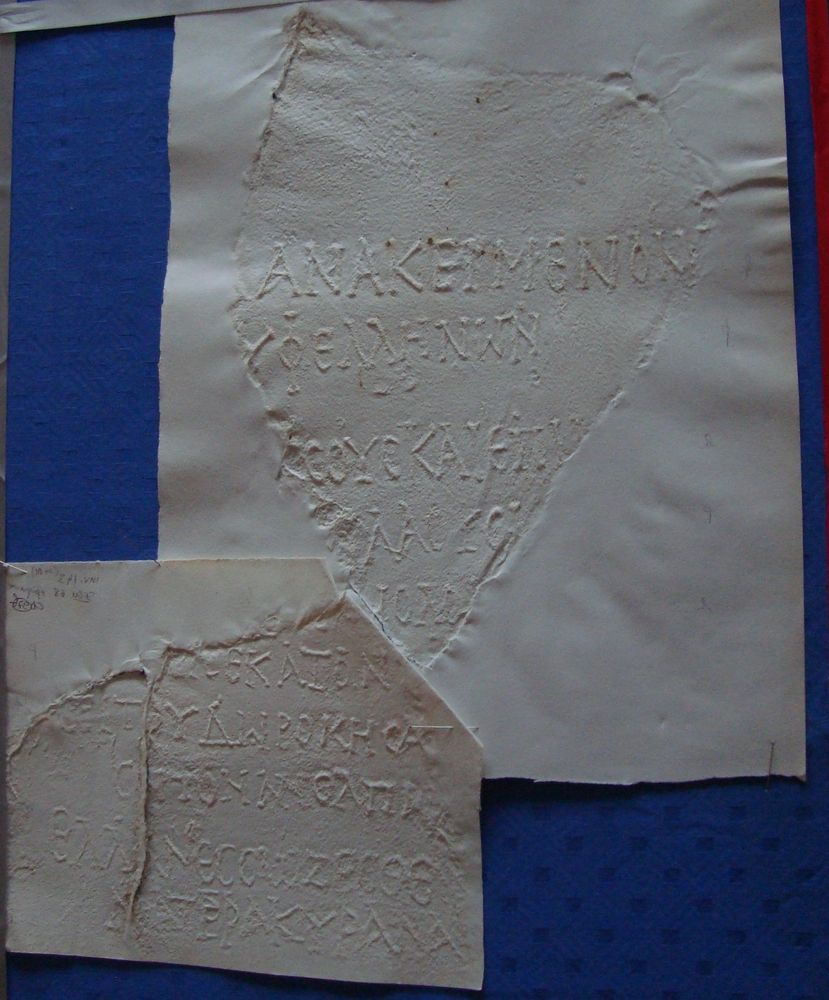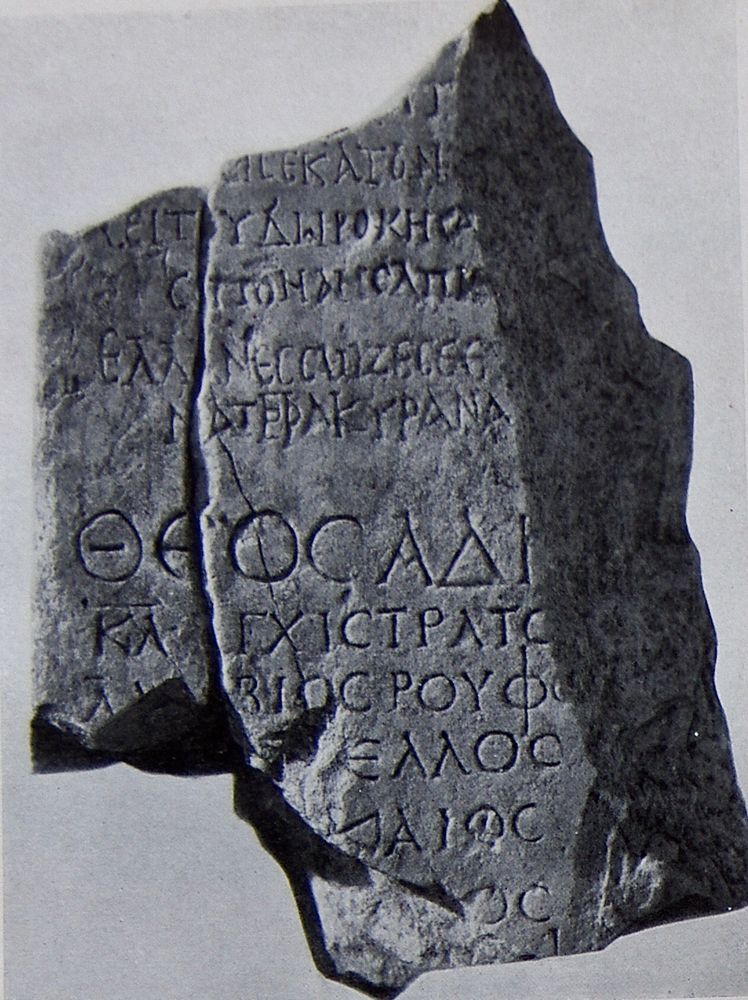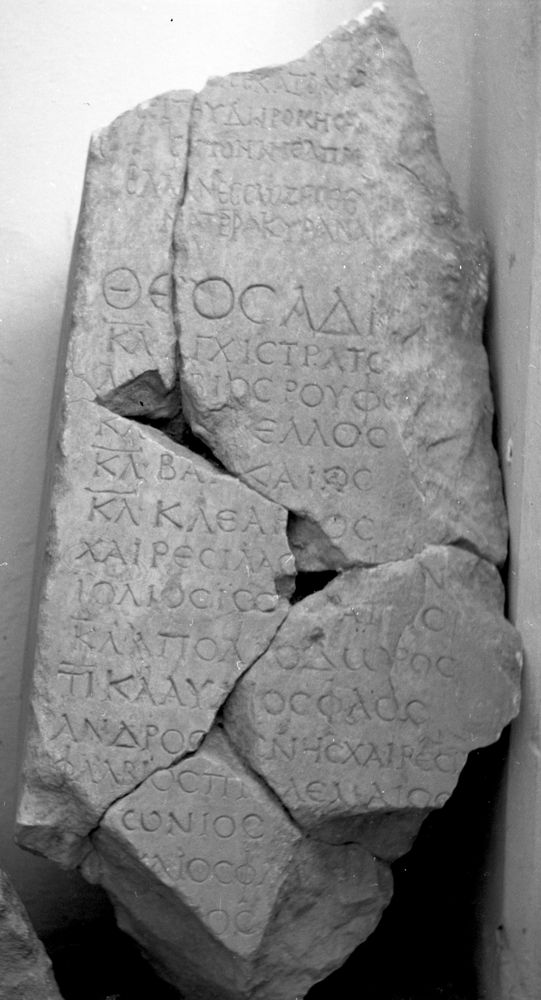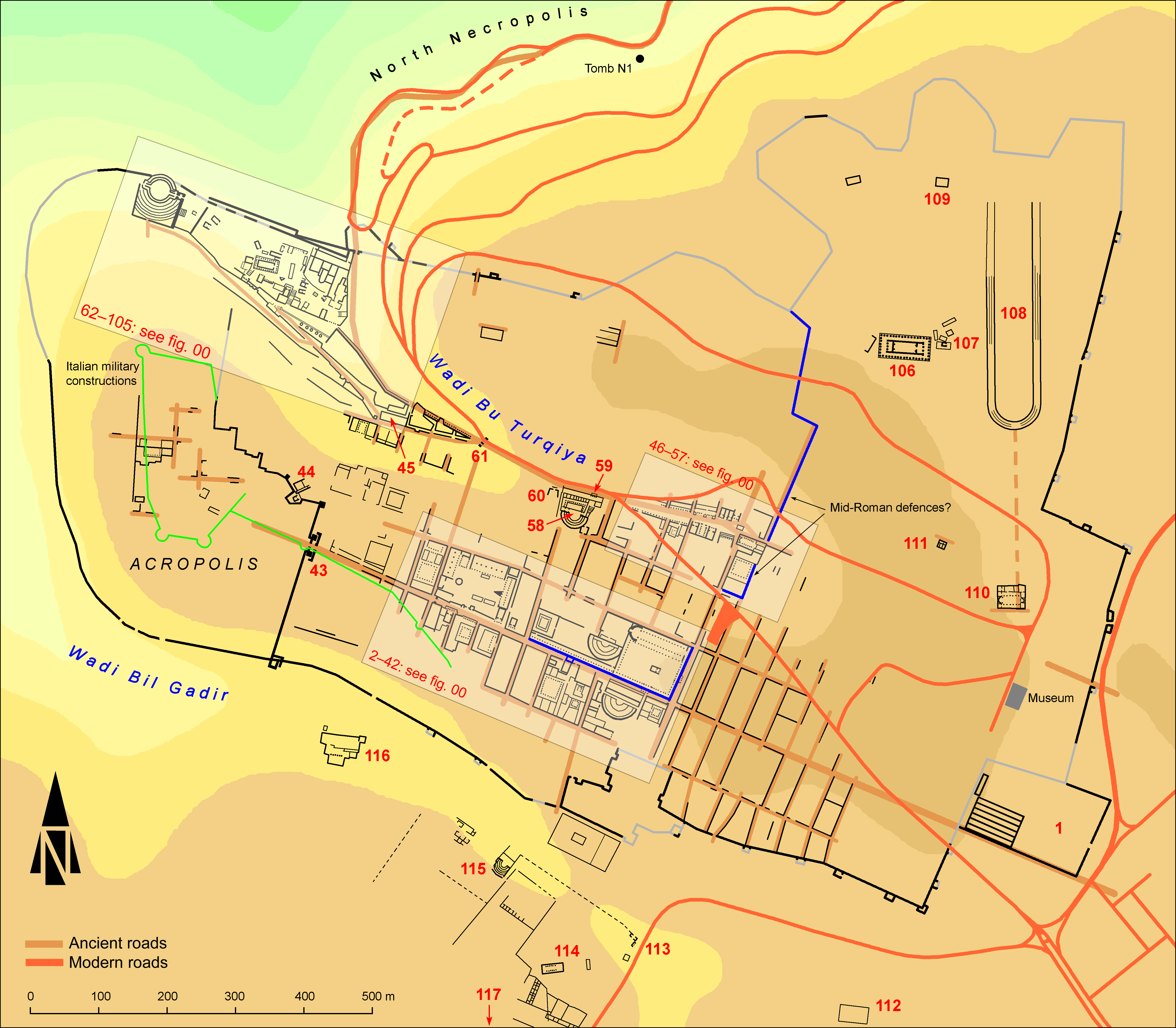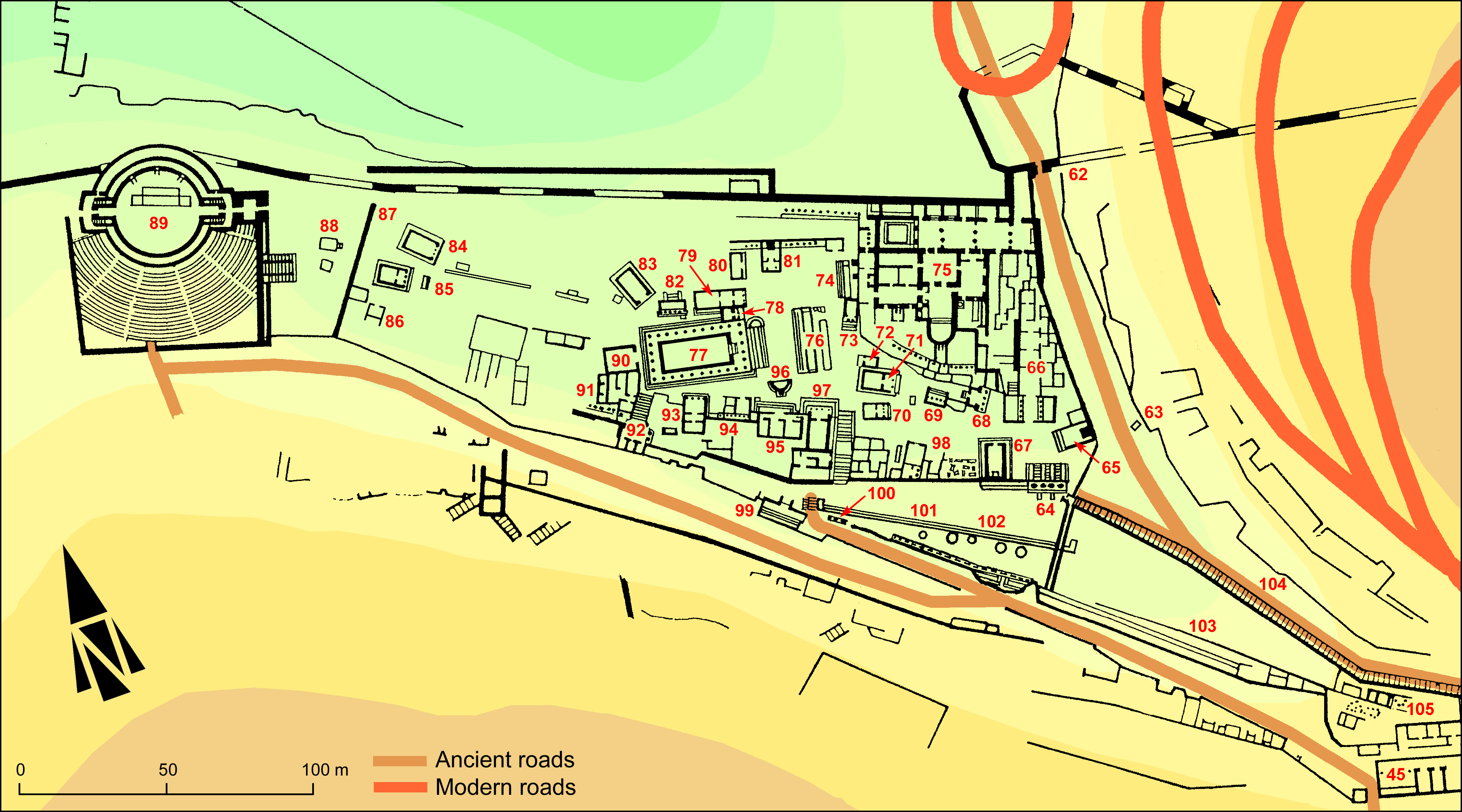EpiDoc XML:
GVCyr0422
Trismegistos ID:
738935
Source description
Support: Two punctually adjacent fragments of a white marble stele;
fragment a is broken off on all sides but at back (w: 0.22 × h: 0.28 × d: 0.15); fragment b is a much larger fragment, reconstituted
from five adjacent pieces (w: 0.37 × h: 0.80 × d: 0.15) and bears below IRCyr2020 C.414 in a different hand.
Layout: Inscribed on the face (beginning at 0.11 of the surviving top) in at least eight lines covering fragment a and the upper part
of fragment b;
lines are more or less grouped by pairs with alternate inset for the metrical part and larger though irregular spaces between
the pairs.
Letters: 0.015-0.023 (phi is 0.035 tall); irregular cutting, generally speaking more careful in the three first lines; alpha with horizontal
or oblique bar, alpha and lambda with right stroke protruding on top, square or lunate epsilon, lunate sigma, phi with very
tall hasta, omega like a M upside down.
Date: Perhaps second century, or rather first half of third century AD (lettering).
Findspot: Probably found already in 1925 at
Cyrene ➚: photographed in 1926 as from the
Sanctuary of Apollo.
Place of origin: Findspot.
Last recorded location: Cyrene Museum, 77+81.
Seen by C. Dobias-Lalou in 1977 and again in 2001 in Shahat:
Cyrene Museum.
Text constituted from: Transcription from stone (CDL).
Bibliography
SECir, 69 (no image) and SECir, 68 (photo); GVCyr 042 ➚. Cf. Reynolds 1978, p. 118.
Text
Interpretive
| (vac.)
[c. 7]Α ἀνακείμενον Γ̣[.. ? ..]
[c. 8] ὑφ' Ἑλλήνων (vac.)
(vac. 1 line)
[c. 7 - 9 δί?]σ̣σους καὶ ἐπὶ κ̣ι̣[c. 6 - 8]
[c. 10 - 12] | ν̣ λαούς Ι [c. 11 - 13]
5 | [c. 11 - 13 φ]α̣τ | ὶ ὅλου̣ [c. 15 - 17]
[ν]α̣ῦς ἑκατὸν π̣[έμψαc. 1 - 3] [c. 12 - 14]
σείτου δωρο<δο>κήσα[τε? c. 10 - 12]·
σ[ε]ῖτον ἀνελπίσ̣[τον c. 14 - 16]
(vac. 1 line)
Ἕλλανες σώζεσθε [c. 14]
10ματ«έ»ρα Κυράνα[ν ---]
1 γ vel η vel π | 10 ancient correction from ρ
Metrical
| (vac.)
[c. 7]Α ἀνακείμενον Γ̣[.. ? ..]
[c. 8] ὑφ' Ἑλλήνων (vac.)
(vac. 1 line)
| [ ˉ ˘ ˘ | ˉ ˘ ˘ | ˉ δί?]σ̣σους καὶ ἐπὶ κ̣ι̣[ ˉ ˘ ˘ | ˉ ± ]
| [ ˉ ˘ ˘ | ˉ ] | ν̣ λαούς Ι [ ˘ ˘ | ˉ ˘ ˘ | ˉ ]
| (5) | [ ˉ ˘ ˘ | ˉ ˘ ˘ φ]α̣τ | ὶ ὅλου̣ [ ˉ | ˉ ˘ ˘ | ˉ ± ]
| [ν]α̣ῦς ἑκατὸν π̣[έμψαc. 1 - 3] [ ˉ ˘ ˘ | ˉ ˘ ˘ | ± ]
5 | σείτου δωρο<δο>κήσα[τε? ˉ ˘ ˘ | ˉ ˘ ˘ | ˉ ± ]·
| σ[ε]ῖτον ἀνελπίσ̣[τον ˉ ˘ ˘ | ˉ ˘ ˘ | ˉ ] | (vac. 1 line)
| Ἕλλανες σώζεσθε [ ˘ | ˉ ˘ ˘ | ˉ ˘ ˘ | ˉ ± ]
| (10) ματ«έ»ρα Κυράνα[ν ˉ ˘ ˘ | ˉ ˘ ˘ | ± ]
1 γ vel η vel π | 10 ancient correction from ρ
Diplomatic
| vacat
[+++++++]ΑΑΝΑΚΕΙΜΕΝΟΝ.[.. ? ..]
[++++++++]ΥΦΕΛΛΗΝΩΝ
vacat
[c. 7 - 9..].ΣΟΥΣΚΑΙΕΠΙ..[c. 6 - 8]
[c. 10 - 12] | .ΛΑΟΥΣΙ[c. 11 - 13]
5 | [c. 11 - 13.].Τ | ΙΟΛΟ.[c. 15 - 17]
[.].ΥΣΕΚΑΤΟΝ.[....c. 1 - 3c. 12 - 14]
ΣΕΙΤΟΥΔΩΡΟΚΗΣΑ[..c. 10 - 12]
Σ[.]ΙΤΟΝΑΝΕΛΠΙ.[...c. 14 - 16]
vacat
ΕΛΛΑΝΕΣΣΩΖΕΣΘΕ[++++++++++++++]
10ΜΑΤ«Ε»ΡΑΚΥΡΑΝΑ[.---]1 γ vel η vel π | 10 ancient correction from ρ
Apparatus
1: α̣: SECir not transcribed || γ̣: σ̣ SECir
4: ν̣: + | Ị SECir
5: [φ]α̣τ | ὶ: [---]α̣τ | ι SECir
6: [ν]α̣ῦς: [---]εις SECir || π̣[έμψαc. 1 - 3]: τ̣[---] SECir
French translation
[---] consacré [---] par les Grecs.
[---] doubles [---] sur [---] les peuples [---] [ dit] que tous [--- ayant expédié] cent navires [---] vous avez reçu en cadeau [---] des céréales [---]; les céréales inespérées [---] Grecs, vous êtes sauvés [---] maternelle Cyrène.
English translation
[---] dedicated [---] by the Greeks.
[---] double [---] on [---] the people [---] [ says] that all [--- having sent] hundred ships [---] you received as a gift [---] grain [---]; the unexpected grain [---] Greeks, you were rescued [---] motherly Cyrene.
Italian translation
[---] dedicato [---] dai Greci.
[---] doppi [---] su [---] i popoli [---] [ dice] che tutto [--- avendo spedito] cento navi [---] avete ricevuto in dono [---] del grano [---]; grano inaspettato [---] Greci, voi siete stati salvati [---] madre Cirene.
Arabic translation
[---] أُهْـدِيَ [---] من قبل الإغريق. [---] مُضاعف [---] على [---] الشعب [--- --- يقول] أن الجميع [--- كونها أَرسْلَتْ] مائة
سفينة [---] التي استلمتُموها كهدية [---] الحبوب [---]؛ الحبوب غير المتوقعة [---] الإغريق، أنتم أُنقِذتُم [---] قورينا الأم
(أي المُشابهة للأمِ في لُطفها ورِعَايتها وحُبها)
